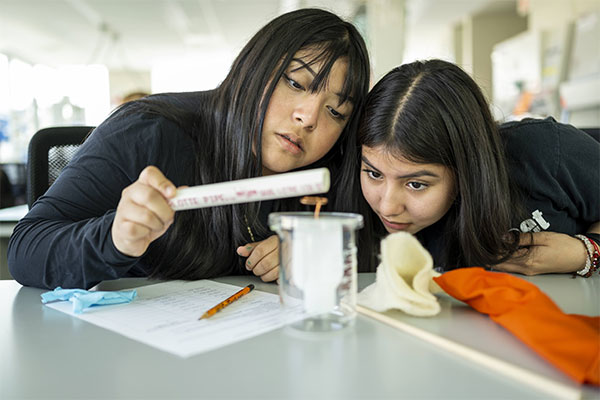Pushing the boundaries of metabolism with cutting-edge technology
In a laboratory at the University of North Carolina at Chapel Hill’s Blood Research Center, undergraduate Katherine Overmyer began to recognize and absorb the power of scientific mentorship.
For three years, Overmyer worked with Professor Alisa Wolberg, a pathologist skilled at passing along skills and concepts while building a scientific ethic in her students.
“She was a wonderful mentor,” says Overmyer. “I learned the basics — skills like pipetting, getting your data reproducible and building a community in the lab.”
Today, she works with Morgridge Investigator and University of Wisconsin–Madison Professor of Biomolecular Chemistry Joshua Coon, as associate director of the Lab for Biomolecular Mass Spectrometry.
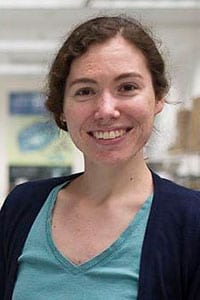
There, Overmyer emulates Wolberg’s approach, continuing to leave a legacy of knowledge for the next generation of scientists.
“She taught me the skills that I still use today when we have new people come to the lab,” Overmyer says. “I enjoy working with students in the lab and seeing how they progress and how they work through problems.”
The Morganton, N.C. native’s interest in science began early and her interest in metabolism grew after her father, a machinist, developed Type 2 diabetes. Her interest eventually resulted in earning a Ph.D. from the University of Michigan with research that focused on how fuel is metabolized during exercise.
Since 2019, Overmyer has supported the day-to-day operations of the lab, which applies cutting-edge mass spectrometry research to important biological questions. The lab collaborates widely on projects involving metabolism and biomarker discovery in human and basic science studies.
The Coon Lab does both metabolomics and proteomics as it tries to understand the interplay between metabolites and proteins.
“I get to work with scientists from all over the nation — Harvard, Michigan and others — and Europe as well, and continue learning,” she says. “They are all coming with their own unique challenges and using our technology to make discoveries. Being able to be part of those bigger efforts is incredibly rewarding.”
Overmyer says the lab is always seeking new collaborative projects that push the boundaries of its technology, improve its methods and unlock important new findings.
“We end up having this really nice collaboration — we get to work on our stuff, and they get really cool data and then in the end we all work together on getting one or two papers out of that work,” she says.
Overmyer loves the variety of projects she shepherds through the lab. For example, she and her collaborators compiled a sophisticated analysis that opens the door to using micro-organisms in your mouth as an indicator of other health issues.
They used multiomics — an integrated approach to viewing multiple levels of biology — to analyze dental plaque.
“The research uses oral health as a gateway to look at other systemic diseases,” says Overmyer. “We’re looking at thousands to hundreds of thousands of organisms that occupy that biome and integrating that into how that affects the host.”
The lab is also working with researchers to study the urine of premature infants to determine if there are predictive biological markers for those who develop kidney problems, allowing early diagnosis.
“We’re pushing the cutting edge of what’s possible, and that’s really where we want to be,” she says.
Rising Sparks: Early Career Stars
Rising Sparks is a monthly profile series exploring the personal inspirations and professional goals of early-career scientists at the Morgridge Institute.
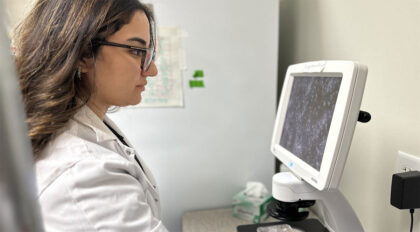
Rising Sparks: Sabina Farhadova, Biomedical Imaging
Working with investigators Melissa Skala and Darcie Moore, Farhadova will use cutting-edge imaging technologies to answer fundamental questions about neurogenesis – the process by which new neurons are generated in the brain – and stem cell biology.
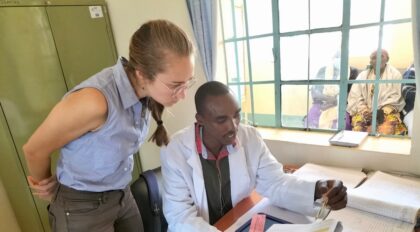
Rising Sparks: Kayla Huemer, biomedical engineering alum
Morgridge alum Kayla Heumer helps accelerate healthcare access for underserved communities in Africa, powered by technology and the 'spirit of frugal innovation.’
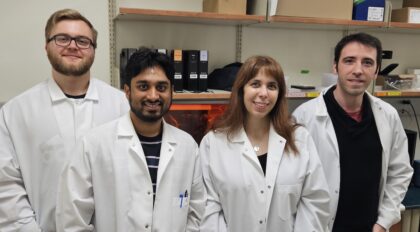
Rising Sparks: Jose Ayuso, biomedical imaging alum
Morgridge alum Jose Ayuso is an assistant professor in UW–Madison’s Department of Dermatology, where his lab uses advanced biomedical engineering technologies to tap the promise of precision medicine.

Rising Sparks: Danielle Lohman, metabolism alum
Morgridge alum lands at the U.S. Department of State, shaping the intersection of science policy and foreign affairs.

Rising Sparks: Nick Arp, metabolism
Nick Arp is building a toolbox of knowledge in the research lab and in the medical clinic, searching for answers to scientific questions that can improve patient care.

Rising Sparks: Raison Dsouza, structural biology
Raison Dsouza is developing new computational methods to analyze cryo-electron microscopy images, trying to find specific particles in “noisy,” corrupted data.

Rising Sparks: Lexi Menendez, regenerative biology
Lexi Menendez credits Morgridge and the PREP program for jump-starting her research career and graduate school future.

Rising Sparks: Kasia Wiech, biomedical imaging
Kasia Wiech, a graduate student in biomedical engineering, is on a mission to bring science out of the lab and into public spaces to highlight the impact of science in our everyday lives.

Rising Sparks: Roma Broadberry, biomedical imaging
Roma Broadberry, a biophysics graduate researcher in the Tim Grant Lab, is helping to illuminate the intricacy of viral replication using cryo-EM.

Rising Sparks: Andrés Tibabuzo, regenerative biology
From 'Jurassic Park' to snake venom to parasitic flatworms, Andrés Tibabuzo is motivated by the science that fascinates him.
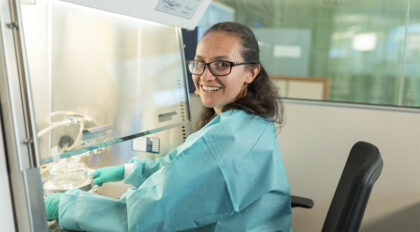
Rising Sparks: Marcela Tabima, regenerative biology
Marcela Tabima has focused her fascination with human biology on two major research efforts in the Discovery Building — engineering synthetic arteries for surgery and finding new ways to treat inherited retinal diseases.
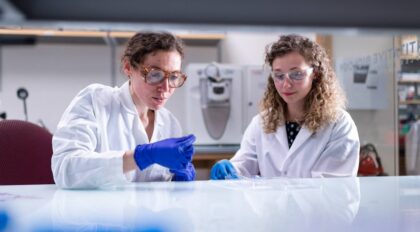
Rising Sparks: Katherine Overmyer, metabolism
Katie Overmyer collaborates with metabolism researchers to push the boundaries of mass spectrometry technology and uncover answers to important biological questions.
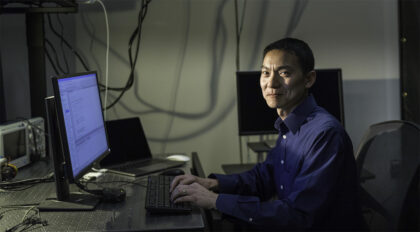
Rising Sparks: Joe Li, biomedical imaging
"You can always learn more": An unquenchable thirst for discovery guides Joe Li’s pursuit of cutting-edge light-sheet microscopy.
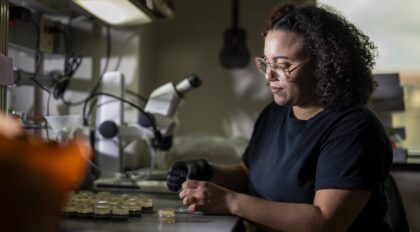
Rising Sparks: Odette Herrand, regenerative biology
Odette Herrand is drawn to the inherent creativity involved in answering complex scientific questions, which they use to study fertility in the fruit fly.
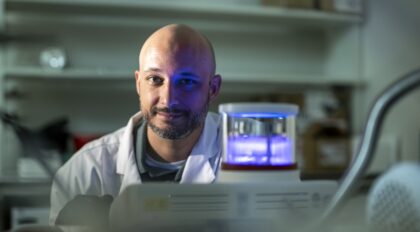
Rising Sparks: Peter Ducos, structural biology
Peter Ducos leans on his military training to solve complex problems and collaborate with other scientists by exploring molecular structures in exquisite detail.
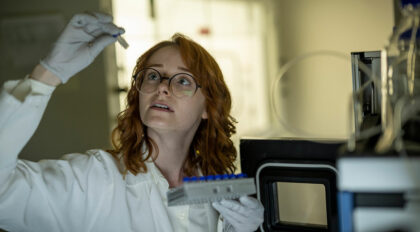
Rising Sparks: Kim Huggler, metabolism
Kim Huggler believes science is fundamentally about creativity, and leverages an innovative cell culture media to reveal biological processes that conventional techniques cannot.
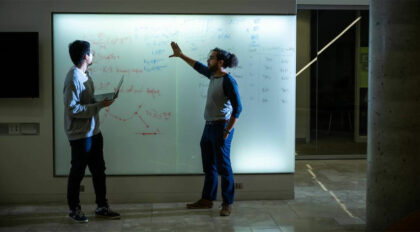
Rising Sparks: Ed Evans, biomedical imaging
Ed Evans sees every challenge as an opportunity to grow, and uses his passion for problem-solving to develop new imaging tools that will help other scientists.

